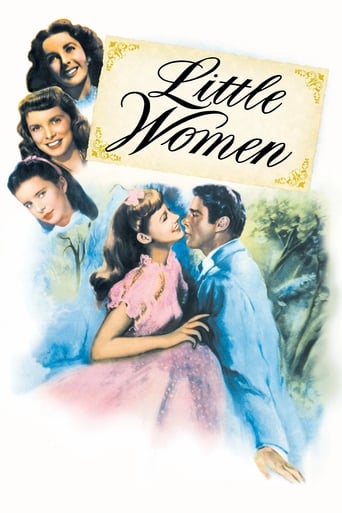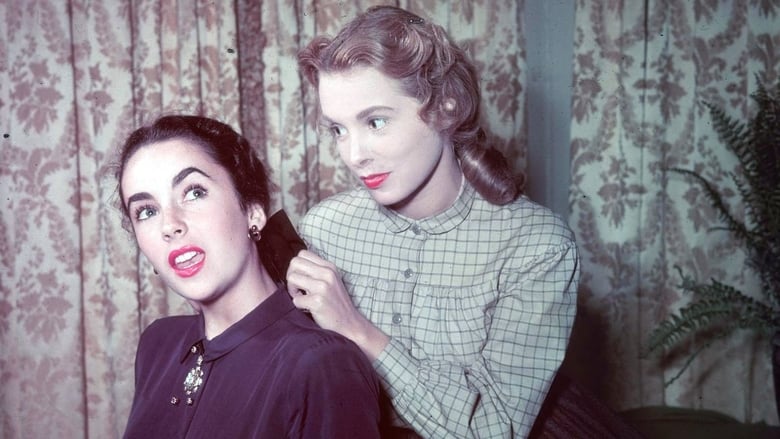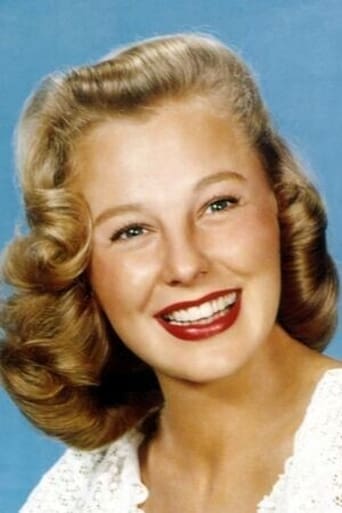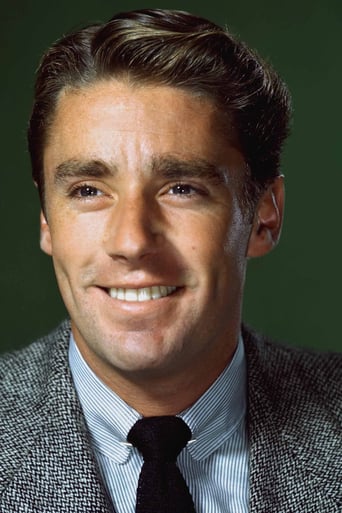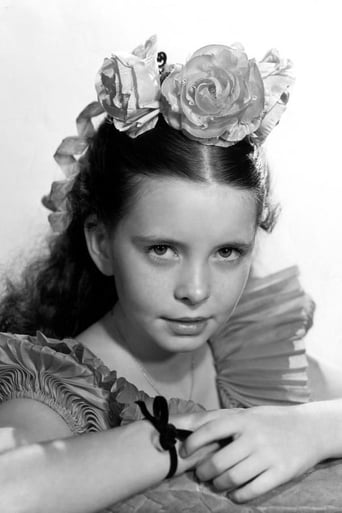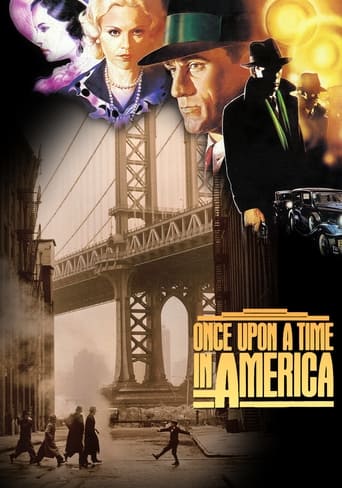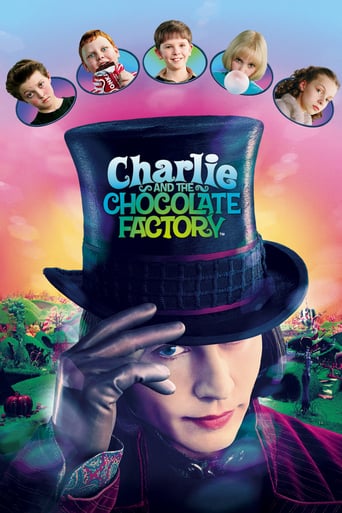Little Women (1949)
Louisa May Alcott's autobiographical account of her life with her three sisters in Concord Mass in the 1860s. With their father fighting in the civil war, the sisters: Jo, Meg, Amy and Beth are at home with their mother - a very outspoken women for her time. The story is of how the sisters grow up, find love and find their place in the world.
Watch Trailer
Cast
Similar titles


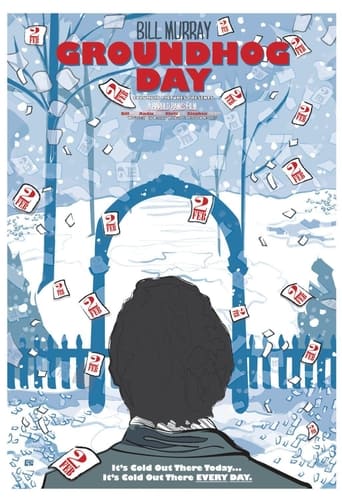
Reviews
People are voting emotionally.
The film creates a perfect balance between action and depth of basic needs, in the midst of an infertile atmosphere.
what a terribly boring film. I'm sorry but this is absolutely not deserving of best picture and will be forgotten quickly. Entertaining and engaging cinema? No. Nothing performances with flat faces and mistaking silence for subtlety.
This is one of the best movies I’ve seen in a very long time. You have to go and see this on the big screen.
Little Women (1949) was directed by Mervyn LeRoy. It's based on the novel by Louisa May Alcott.MGM decided to give moviegoers an all-star cast, and that's what we see in this film. There are six major roles in this film: the four March sisters, their mother "Marmee," and Laurie, who is in love with one of the sisters. Here's the cast MGM put together: Meg March - Janet Leigh Jo March - June Allyson Amy March - Elizabeth Taylor Beth March - Margaret O'BrienTheir mother (Marmee) - Mary Astor (Astor said she hated the "good mother" roles, but she was perfect in this film.)Laurie (in love with Jo) - Peter Lawford. Even some of the minor parts were played by excellent actors. For example, Professor Bhaer, whom Jo meets in NYC, was played by Rossano Brazzi, who was an international star.We all know that "Little Women" is not the U.S. equivalent of "War and Peace." However, the novel definitely has its merits, and so do the movies based on the novel. "Little Women" is often dismissed as a children's book. It's not. It deals with a theme that resonated with readers--women on the home front when the men are away. It's a coming of age novel, and it deals with love, loss, and determination. This is an adult movie, based on a book for adults.Director LeRoy had immense talent himself, and he knew how to draw great performances out of his talented cast. Jo March is a stand-in for the author. She feels the most confined by the restrictions placed on women 150 years ago, and she's the most eager to break out of those stereotypes. In 1933, the role of Jo was played by Katharine Hepburn. In my opinion, June Allyson is better suited for this role. However, Hepburn has something no other actor had--the ability to dominate any scene in which she appeared. Allyson really is great as Jo, but she just can't be Katherine Hepburn. Nobody could be. Elizabeth Taylor was 17 when she played Amy. Of course, now we know that she would go on to win two Oscars. Janet Leigh was 22 when she played Meg, the oldest sister. She was not yet a star, but the star quality was there. Margaret O'Brien was only 11 when she played Beth. She was one of the greatest child stars Hollywood has ever seen. (In 1949 she already had won a Juvenile Academy Award Oscar.) Sadly, she never made the transition to adult roles, but she was superb in Little Women. Most films suffer by being seen on a small screen, rather than in a theater. This may not be true of this movie. The sets and the scenery are obviously--and painfully--artificial. If they look this bad on DVD, imagine what they'd look like on the large screen.Other than the bad sets, this version of Little Women is an outstanding book-to-film success. I highly recommend it.
Superb adaptation of Louisa May Alcott's novel. Wonderful, moving, bitter-sweet, often funny story, beautifully told. The sense of family and sweet innocence is palpable. Makes you long for simpler times.Solid direction by Mervyn LeRoy. The film moves along at a brisk pace and is constantly engaging.Great performances all round. June Allyson is superb as Jo. Elizabeth Taylor, only 16/17 years old at the time, shows the talent that would make her one of the greatest actresses of all time. Janet Leigh, in one of her earliest roles, is great as Meg. 12-year old Margaret O'Brien almost steals the show as the sweet and precocious Beth. Solid support from Peter Lawford, Mary Astor and Rossano Brazzi.0A classic.
Louisa May Alcott's novel is not only a beloved American classic but is also well-known in Britain, so I need not repeat the plot here. Suffice it to say that it concerns the adventures of four sisters growing up in a small New England town during the Civil War, in which their father is fighting. The novel has been filmed a number of times but I have not seen any of the other films apart from the 1994 version starring Susan Sarandon and Winona Ryder, and as that was many years ago I will not attempt a direct comparison. During the forties and early fifties, many films set in the Victorian period were made in black- and-white, "Dragonwyck" being an example. MGM, however, decided to make "Little Women" in Technicolor, and I think that this decision paid off. Like the British "An Ideal Husband", also from the late forties, the film can be seen as an early example of the "heritage cinema" style of film-making. Although it was filmed in a studio rather than on location, there are loving recreations of Victorian interiors and costumes, all shot in warm, rich colour. There is an emphasis on dark reds and greens, possibly because these colours were felt to be particularly appropriate to Christmas, the season during which much of the action in the first half takes place. My main complaint about the film would be its often eccentric casting. I never thought it would be possible to make the gorgeous teenage Elizabeth Taylor look unattractive, but here as Amy, in a blonde wig and too much make-up, she looks very odd indeed. As in some of her other early films the London-born Taylor struggles with an American accent, but at least she does make an effort, unlike the former England cricket captain Sir C. Aubrey Smith, who makes no effort at all and simply plays his character, old Mr. Laurence, as an upper-class British gentleman. (This was Smith's final film; he died before it was released. Professor Bhaer is played by the Italian actor Rossano Brazzi, which explains why this German professor speaks not only English but also his native language with an Italian accent and believes that his country's greatest poet had the surname "Getta". Lucile Watson makes Aunt March seem too unpleasant, and the kind heart which Aunt March is supposed to hide beneath her gruff exterior remains too well-hidden. The worst piece of miscasting, however, is that of June Allyson as Jo, probably the most important character in the story. Jo is supposed to be a teenager- her date of birth is given as 1846- so why was the 32-year- old Allyson cast in the role? Allyson was a decade older than Janet Leigh, who plays Jo's supposedly older sister Meg, and only eleven years younger than Mary Astor, who plays her mother. Jo, an independent and free-spirited girl, is often hot-tempered and impetuous, but we can forgive her because these are the sins of youth and because we admire her spirit. At least, we can forgive the Jo of the novel. Allyson's Jo is much less forgivable, if only because it is all too obvious that she is no longer in her first flush of youth, and she can come across as petulant and sharp-tongued, and also rather cruel in her treatment of her admirer Laurie. Allyson's harsh accent didn't help matters either. Taylor seemed rather weak as the vain, self-obsessed Amy, but I felt she might have made a better Jo.Leigh is better as Meg, but she is not given a very big role in this film; the best of the sisters is Margaret O'Brien who makes an endearing Beth, here played as a child although in the novel she is older than Amy. Astor is also good as "Marmee", as is Smith if one can overlook his accent. The film keeps reasonably close to Alcott's plot although there are a few minor changes. Although there are references to the Civil War, for example, the causes of that war are never mentioned. I suspect that this change would not have pleased Alcott, who held strongly anti-slavery opinions, but Hollywood producers, with an eye on the Southern box- office, were always wary of making films which might be seen as advocating the Northern cause too strongly. Overall, the film should please lovers of the novel, but I felt that it would have been improved by more appropriate casting. 6/10 An odd coincidence. When I read the book, many years ago, I was amused that Jo's first boyfriend (whose real name is Theodore Laurence) was called "Teddy" and her second "Bear", which is how Professor Bhaer's surname is pronounced, and what it means, in German. As the expression "Teddy Bear" did not exist in Alcott's lifetime this would not have struck her original readers as odd in any way, but I wonder if this was why Theodore is never referred to as "Teddy" in the film.
Even Louisa May Alcott would have been disappointed wih this 1949 remake.With her hoarse voice, June Allyson lacks the exuberance of Katharine Hepburn. Elizabeth Taylor is as sour at the beginning as can be. She is almost cruel and as self-centered as they come. Did it make sense to all that while her young sister was dying, she went off to Europe with her maiden aunt, nicely played by Lucile Watson. Watson did an excellent job in reprising the role so memorably created by Edna Mae Oliver in the 1933 original. However, must they have made the trip in order to catch up with Peter Lawford, who had been abandoned by Jo (Allyson)?Janet Leigh, as the sister who married, and "dad" Leon Ames are totally wasted here. Leigh appears but says so little and does anyone realize that when Ayres appeared, the great Civil War must have ended. What happened there?Rosano Brazzi is way out of his league as the foreign-born professor who brings culture and love into the life of Jo.
